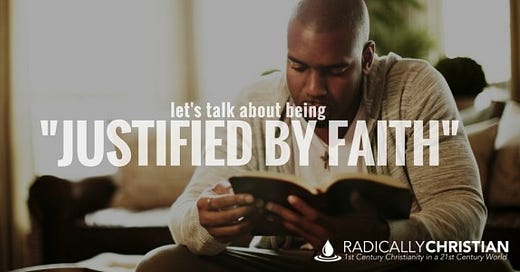Let’s Talk About Being Justified by Faith
The concept of “justification by faith” is one of the most important doctrines in Scripture. Unfortunately, some misunderstand it, some scoffingly dismiss it, and some ignore it completely. But let me tell you something (and I don’t think I’m overstating the case here), you cannot be a Christian unless you understand and embrace the doctrine of justification by faith. So let’s talk about what it means to be justified by faith.

Justifying Ourselves
To justify something means to make it right. Sometimes people attempt to justify themselves by showing they are not really wrong. In other words, they defend their actions by either making excuses or explaining why their actions are defensible. In a courtroom – according to the strict letter of the law – this is the only way to find justification: by showing you are in the right.
Religiously, we all have a tendency to do this. When someone confronts us with our sin, we attempt to justify ourselves. We try to justify ourselves by technicality, “I don’t think that’s technically a sin.” If that doesn’t work, we try to justify ourselves by comparison, “Well, at least I’m not as bad as other people.” Finally, we try to justify ourselves by circumstances, “The only reason I did that was because of the situation I was in.”
The Pharisees were experts at justifying themselves. They believed their strict obedience to the Law made them right in God’s sight. They believed they were right because…well, because they were right. As Luke put it, they “trusted in themselves that they were righteous” (Luke 18:9).
Guilty As Charged
The problem with the Pharisees trying to justify themselves – and the problem with us trying to justify ourselves – is that there is no justification for even one sin. There is no excuse. There is no defense. We are all guilty.
Jesus told a parable about a Pharisee who prayed, “God, I thank you that I am not like other men, extortioners, unjust, adulterers, or even like this tax collector. I fast twice a week; I give tithes of all that I get” (Luke 18:11-12). He didn’t think he needed to be justified by God. He thought he was an innocent (righteous) man. But that wasn’t true. He was guilty, but refused to recognize it.
The tax-collector, on the other hand, knew his guilt. He didn’t try to make excuses. He didn’t try to explain away his guilt. Rather, “standing far off, would not even lift up his eyes to heaven, but beat his breast, saying, ‘God, be merciful to me, a sinner!’” (Luke 18:13). Jesus said, “This man went down to his house justified, rather than the other” (Luke 18:14).
Those who attempt to justify themselves, who trust in themselves that they are righteous, will find no justification with God. In other words, if a person believes his performance – his obedience to God’s rules – makes him justified in God’s sight, then he will find no mercy with God. God only has mercy if we admit we are “guilty as charged” and stop trying to make excuses.
Justified by Faith in Christ
Christianity is simple: Jesus, God-anointed King over all Creation, offered Himself as a blood sacrifice on behalf of humanity. In other words, His blood was offered as the means of atoning for (“covering over”) mankind’s sin, guilt, and shame. God considers anyone covered by Jesus’ blood to be completely righteous and justified in His sight.
But in order to be covered by His blood, you have to accept His gift by faith. You have to put all of your trust in Jesus. You have to admit there is no excuse or defense for your rebellion and your sin. You have to admit you deserve death. You have to accept by faith that His blood – and His blood alone – has the power to make you right in God’s sight.
There were many First-Century Christians who tried to have it both ways. They tried to be Christians, while at the same time believing they could justify themselves. Paul emphatically explained over and over again, you can’t have it both ways. You are either justified because you are an absolute perfect Law keeper (see Galatians 5:3; 6:13) or you are justified because you trust in Jesus’ atoning sacrifice. After all, if it was possible to be so obedient that you didn’t need Jesus’ blood, “then Christ died for no purpose” (Galatians 2:21).
Baptism
This is what we’re expressing when we, in penitent faith, go down into the water of baptism. We are saying, “Have mercy on me a sinner.” We are expressing our complete trust in the atoning power of the blood of Christ. We are acknowledging our guilt and our desire for forgiveness (see Acts 2:38; 22:16; 1 Peter 3:21). We are committing ourselves to lifelong reliance upon Christ. We are saying we will never be worthy and we will always need His blood (1 John 1:7) and we will always be faithful to Him (Romans 6).
Although baptism is the moment at which we express our faith in Christ and receive salvation by faith, we must be careful not to think we are justified because of our obedience (see 2 Timothy 1:9). There is a very real danger in patting ourselves on the back and saying, “I’m right with God because I’ve been obedient.”
Satan would love for us to get baptized, thinking it is a process through which we justify ourselves; a new law we obey to prove we’re actually pretty good people. Satan would love for us to think we’ve earned something, rather than received something. He wants us to stay in a state of mind that is constantly trying to prove we’ve been good enough and obedient enough to deserve salvation.
By Faith Alone?
Finally, James’ wrote, “A person is justified by works and not by faith alone” (James 2:24). He wasn’t contradicting what Paul said. He was simply saying that real faith can be seen in action. Faith is not something that is merely intellectual – it must be lived out.
It is right to say we are justified by faith in Christ; so long as we realize that faith in Christ is something that is lived out in daily discipleship. We are justified because we believe and trust in Jesus and that belief and trust can be seen in what we do. If our belief and trust isn’t evident in our good works, then it doesn’t actually exist.
Bottom Line
The bottom line is this: How you answer the question, “What makes you think you’re right with God?” is of the utmost importance. Do you have confidence in yourself or in the saving blood of Jesus Christ?
I love you and God loves you,
Wes McAdams
The post Let’s Talk About Being Justified by Faith appeared first on Radically Christian.




